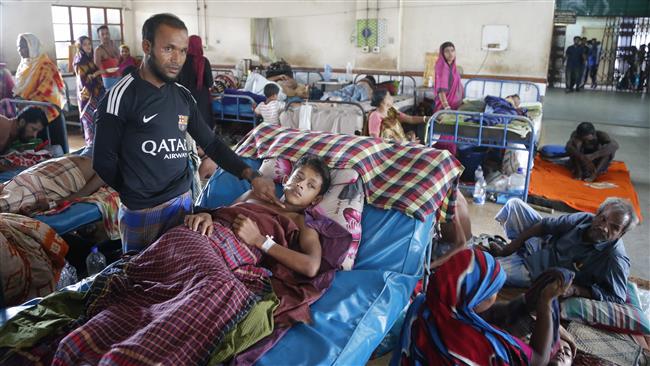
RNA - Speaking at the UN Human Rights Council on Monday, Zeid Ra’ad al-Hussein slammed Myanmar for refusing to give human rights investigators access to the troubled western Rakhine State, where Rohingya Muslims are mainly based.
“The current situation cannot yet be fully assessed, but the situation seems a textbook example of ethnic cleansing,” the UN High Commissioner for Human Rigts said.
He said more than 270,000 Rohingya Muslims living in Rakhine had fled to neighboring Bangladesh, with more trapped on the border, amid numerous reports of brutal atrocities being committed against them, including the burning of villages and extrajudicial killings.
“I call on the government to end its current cruel military operation, with accountability for all violations that have occurred, and to reverse the pattern of severe and widespread discrimination against the Rohingya population,” Zeid said.
The Dalai Lama speaks out against Myanmar
Meanwhile, as international pressure mounts on Myanmar to stop the atrocities, the Dalai Lama, who is the spiritual leader of Buddhists, has expressed profound concern over the ongoing violence against Myanmar’s Muslims, urging the country's de facto leader Aung San Suu Kyi to find a peaceful solution to the crisis.
“I appeal to you and your fellow leaders to reach out to all sections of society to try to restore friendly relations throughout the population in a spirit of peace and reconciliation,” said in a letter to Myanmar’s disgraced Nobel Peace Prize laureate.
The Dalai Lama says the suffering of Rohingya Muslims fleeing violence in Myanmar would have inspired the Buddha to help.
Those who are harassing Muslims “should remember Buddha," said the Dalai Lama, also a Nobel peace laureate, adding that the Buddha would have definitely extended a helping hand to "those poor Muslims."
Myanmar using landmines to harm fleeing Rohingya
Meanwhile, Amnesty International and Bangladeshi officials have slammed Myanmar’s military for using landmines against the Rohingya Muslims fleeing violence at home, causing many of the refugees to sustain serious injures or lose their body organs.
The United Nations says 300,000 Rohingya Muslims have fled to neighboring Bangladesh since the Myanmar military unleashed another deadly campaign against the Rohingya-majority Rakhine State two weeks ago.
Bangladeshi officials and Amnesty International experts believe new landmines have been recently planted, including one that the rights group said blew off a Bangladeshi farmer’s leg and another that wounded a Rohingya man. Both incidents occurred Sunday.
AP reporters in Bangladesh on Monday saw an elderly woman injured by a landmine. She had devastating leg wounds: one leg with the calf apparently blown off and the other also badly injured. Relatives said she had stepped on a landmine.
Amnesty said, based on interviews with eyewitnesses and analyses by weapons experts, there was “targeted use of landmines” along a narrow stretch of the northwestern border of Rakhine State that is a crossing point from Myanmar to Bangladesh for fleeing Rohingya Muslims.
“All indications point to the Myanmar security forces deliberately targeting locations that Rohingya refugees use as crossing points,” Amnesty official Tirana Hassan said in a statement Sunday.
She called it “a cruel and callous way of adding to the misery of people fleeing a systematic campaign of persecution.”
Myanmar has one of the few military forces, who have openly used anti-personnel landmines in recent years, according to Amnesty. An international treaty in 1997 outlaws the use of this weapon.
Meanwhile, doctors treating Rohingya refugees in Bangladesh have been astonished and overwhelmed by the scope of injuries they sustained in the brutal violence.
“We have never seen such violent injuries before,” said Dr. Shaheen Abdur Rahman Choudhury, the head of Sadar Hospital in Cox’s Bazaar.
It is the first time the doctors are dealing with injuries like gunshot wounds, blunt force trauma and stab wounds on a massive scale.
Eighty Rohingya Muslims with gunshot wounds, among other injuries like cuts and infections, are being treated at this overwhelmed medical facility.
Myanmar’s forces have been attacking Rohingya Muslims and torching their villages in Rakhine State since October 2016. The attacks have seen a sharp rise since August 25, following a number of armed attacks on police and military posts in the troubled western state.
The latest eruption of violence in Rakhine has killed more than 1,000 people, according to the UN.
An armed group that claims to be fighting to defend the Rohingya declared a unilateral ceasefire on Sunday to let aid reach the displaced.
The Myanmarese government, which blames the armed group for the violence, has rejected the call and said, “We have no policy to negotiate with terrorists.”
Protests in London, Karachi
Amid the international criticism of Myanmar’s atrocities against Rohingya Muslims, protests continue around the world decrying the humanitarian crisis unfolding on the Bangladesh-Myanmar border.
Protesters gathered outside the Myanmar Embassy in central London on Sunday to demonstrate their support for the displaced Rohingya.
Last week, 157 British lawmakers and peers called on Foreign Secretary Boris Johnson to suspend the UK training of Myanmar’s military forces given the brutal campaign underway against Rohingya Muslims.
The training of the Myanmar military cost London around £305,000 last year.
Johnson has already warned Suu Kyi that the mistreatment of the Muslim minority community is “besmirching” the country’s image.
Pakistanis also took to the streets of Karachi on Sunday in a mass protest in solidarity with the Rohingya.
The protesters exhibited numerous placards denouncing the persecution of the minority Muslim group, and called for the revocation of State Councellor of Myanmar Aung San Suu Kyi's Nobel Prize.
847/940